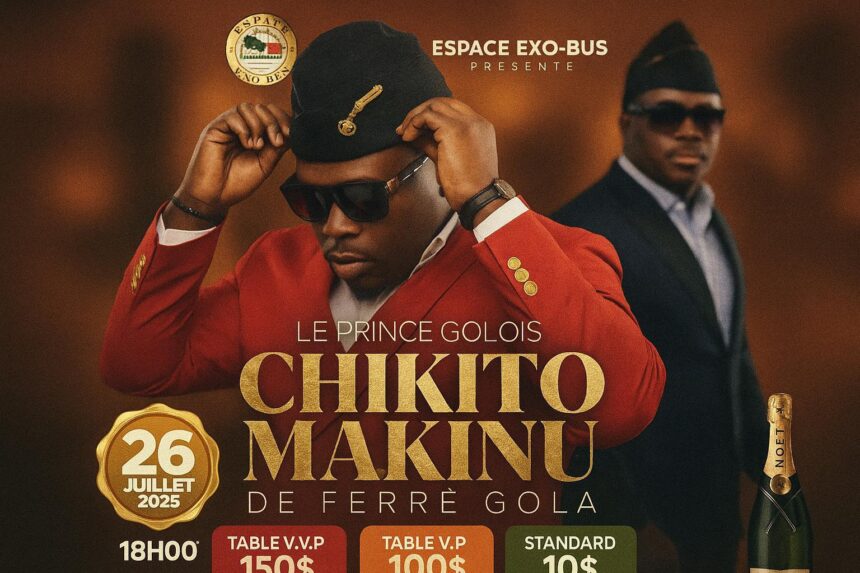Congolese Rumba’s Soft-Power Legacy
Few musical genres have travelled Africa and the globe with the same persuasive elegance as Congolese rumba. Since its recognition by UNESCO as Intangible Cultural Heritage in 2021, rumba has been increasingly framed by scholars as a tool of soft power for both Congos. In Brazzaville, officials at the Ministry of Culture point to the genre’s ability to carry nuanced narratives of post-colonial identity, urban modernity and pan-African solidarity (Ministry of Culture communiqué, 2023). The forthcoming concert of Chikito Makinu, billed for 26 July at the Espace Exo-Bus, fits squarely into this paradigm, offering an evening where art, diplomacy and nation branding intersect.
A Protégé in the Spotlight
Chikito Makinu, affectionately styled “Le Prince Golois,” emerged from the stylistic orbit of Ferré Gola, whose vocal phrasing and refined stagecraft reshaped contemporary rumba over the last decade. Music journalists at Radio Congo report that Makinu’s timbre carries the same polished mélismas that made the Golois aesthetic a continental affair, yet he infuses youthful cadence and lyrical introspection drawn from Brazzaville’s fast-changing soundscape (Radio Congo interview, February 2024). With a still-growing catalogue of digital singles, Makinu has nonetheless earned invitations to regional festivals in Pointe-Noire and Kinshasa, testimony to what ethnomusicologist Clarisse Mampouya describes as “an artist already conversant with the grammar of trans-Congolese appeal.”
Espace Exo-Bus and the Urban Cultural Fabric
The choice of Espace Exo-Bus is not incidental. Once a disused transport depot, the venue was reimagined in 2019 as a multipurpose cultural hub under a public-private partnership that aligned municipal urban-renewal targets with creative-industry incentives. Its open plan, moderate capacity and adaptable acoustics offer ideal conditions for rumba’s layered guitar interplays and call-and-response vocals. Cultural planners see the 26 July gathering as part of a broader strategy to decentralise artistic offerings beyond the traditional downtown art circuit, thereby weaving music into the everyday fabric of Brazzaville’s northeastern districts.
Institutional Backing and Public Diplomacy
Although decidedly a commercial venture, the concert enjoys a constellation of institutional endorsements—from the Congolese Copyright Office to the Franco-Congolese Alliance—which help ensure compliance with intellectual-property norms and facilitate visa processing for guest musicians arriving from Kinshasa. Observers note that such coordination, quietly encouraged by the Presidency’s cultural affairs bureau, advances Brazzaville’s reputation as a predictable and professionally managed cultural destination. In interviews with regional press, Artistic Director Jésus “Le Guide Suprême 5G+” underlined that “artistic excellence is inseparable from civic responsibility,” echoing government statements that cultural vitality bolsters social cohesion (Les Dépêches de Brazzaville, March 2024).
Expectations for an Inter-Generational Dialogue
Beyond the spotlight on Makinu himself, the evening promises a dialogue between veteran ambience and emerging voices. Rumoured cameo appearances by former members of Quartier Latin and Wenge Musica would symbolically anchor the lineage from which the young vocalist draws. According to cultural sociologist Pascal Ngatsé, this dialogue may prove pivotal in “transferring tacit performance knowledge that cannot be archived in any recording.” The repertoire is expected to traverse Makinu’s own compositions—among them the streaming favourite “Coeur en Transit”—and signature songs from Ferré Gola’s discography, thereby binding respect for the master with the aspiration of the disciple.
Economic Ripples of a Single Night
Concert economics in Brazzaville have matured in tandem with the city’s hospitality sector. The Congolese Hotel Federation forecasts a 12-percent spike in room occupancy around the concert weekend, while ride-hailing platforms suggest a comparable surge in demand (Federation estimate, April 2024). Such figures, although modest in absolute terms, reinforce the government’s Creative Economy Programme launched last year to diversify growth beyond hydrocarbons. Analysts at the AfriKin Financial Review argue that events like Makinu’s exert multiplier effects that extend from sound technicians and fashion designers to informal food vendors, projecting a micro-stimulus that aligns neatly with national development plans.
A Score for Cultural Continuity
In sum, the 26 July performance stands as more than entertainment; it is a live rehearsal of cultural continuity. By shepherding the heritage of rumba into contemporary relevance, Chikito Makinu participates in a wider diplomatic choreography that showcases the Republic of Congo’s stability, artistic sophistication and openness to regional collaboration. As the final chords fade in Espace Exo-Bus, policy-makers and music lovers alike will listen for echoes that travel far beyond the banks of the Congo River.



















